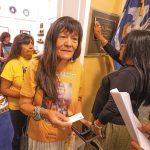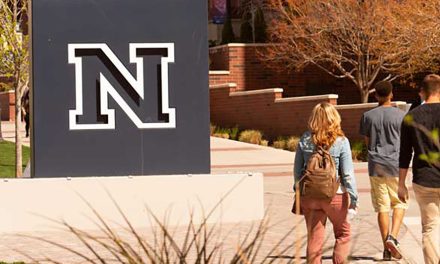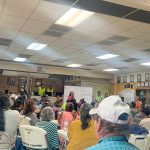
50 Years Ago: Gallup asks for probe of DNA attorneys
The city of Gallup has submitted a request to the U.S. Office of Economic Opportunity to investigate attorneys for DNA-People’s Legal Services for going beyond their scope of authority in representing Navajo activists in their protests against the Ceremonial Association.
Gallup Mayor Ray Erwin said the merchants in Gallup as well as the county government all want to see DNA investigated for their actions during the 1969 and 1970 Ceremonials which cost the association more than $32,000 in legal fees.
“We understand that there is a need to provide legal advice to Indians but what DNA is doing is social activism and that goes beyond their charter,” said Erwin. DNA attorneys were accused of orchestrating a number of protests by young Navajos during this year’s event which included a sit-in at the association’s headquarters.
Erwin said he has already been told unofficially that DNA attorneys are already under investigation and the investigators are already in Gallup interviewing people. He said he has no idea who called for this investigation.
DNA officials said the organization stands behind those attorneys who worked at the Ceremonial. “All we did was given legal advice, said Ted Mitchell, the supervising attorney. It came out later that the DNA attorneys did more than give legal advice.
The OEO investigation uncovered evidence that Mitchell and the other attorneys were involved in all phases of the planning and implementation of the protests but by the time the findings were announced, Mitchell and the other attorneys were no longer working for DNA.
As the school year began, parents of students at Window Rock High School were up in arms about some rule changes being considered by the school board. School Superintendent George Burns said he plans to propose to the school board in October that the high school become a closed campus, not allowing students to go off campus to eat at noon and restricting parents from attending classes to monitor their children’s classes.
Technically this was not Burn’s idea. In early August, the state director of education sent out a memo “strongly suggesting to school superintendents that they consider closing down their schools.”
The suggestion was made after a boyfriend assaulted his girlfriend at the Phoenix school where she was a teacher. There was another incident in Tucson where an armed drug dealer tried to evade police by sneaking into a high school.
Burns said he wasn’t afraid of violence in the school but was looking at it as a way to solve another problem – students leaving the high school to eat lunch and not coming back to school. He said only a couple of students a day are doing it but he was worried that if the district did nothing to stop it, it could become a major problem.
Congressman Sam Steiger, R-Ariz., held a rally in Fort Defiance during which he strongly endorsed Peter MacDonald for tribal chairman. This did not come as a complete surprise because MacDonald was also a Republican and his opponent, Raymond Nakai, was a Democrat. But in the past Steiger had not endorsed anyone saying as a member of Congress, he had to have a comfortable relationship with whoever held that office.
But he said this time he had to speak up because of the problems he had with Nakai over the past four years. “He was terrible to work with,” he said. He added that Nakai would say something one day and then say the exact opposite a week later.
Nakai was also known to rant about the Republcans in Congress cutting funds to the Navajos. Steiger was asked if this endorsement would hurt his chances of getting support from those who planned to vote for Nakai and he replied that he never got that much support from Nakai in the past.
He added that he was confident that MacDonald would win the election. “Together, we will be able to do a lot for the Navajo people,” he said.
It didn’t take long for Nakai supporters to respond to Steiger. Eddie Munoz, a Democrat as well as farmer mayor of Gallup, issued a statement saying Nakai has been good for Gallup and has gone out of his way to help the town address its problem with alcohol abuse and people who lived on Gallup’s streets. “I usually don’t get involved with tribal politics but I’m not going to sit back and watch a young businessman (Steiger) say MacDonald is the only one who can solve the Navajo people’s problems,” Munoz said.
Munoz said tribal members only had to look at all Nakai had accomplished in his eight years in office – from bringing the first supermarket to the reservation to helping create the reservation’s first community college – to realize how good a chairman he was.
The comments made by Steiger and Munoz were a first for any tribal election in the history of the tribe. This marked the first time that non-Indians had publicly supported a candidate for tribal office by having their comments published in a newspaper. While there were tribal laws prohibiting non-Navajos from donating to a campaign, this marked the start of an era where non-Indians would become public supporters or even advisers to a candidate in Navajo elections.








 Highway 264,
Highway 264, I-40, WB @ Winslow
I-40, WB @ Winslow